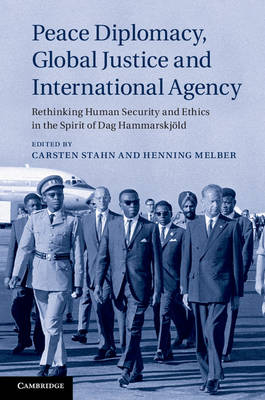
Peace Diplomacy, Global Justice and International Agency
Cambridge University Press (Verlag)
978-1-107-03720-5 (ISBN)
As UN Secretary-General, Dag Hammarskjöld shaped many of the fundamental principles and practices of international organisations, such as preventive diplomacy, the ethics of international civil service, impartiality and neutrality. He was also at the heart of the constitutional foundations and principles of the UN. This tribute and critical review of Hammarskjöld's values and legacy examines his approach towards international civil service, agency and value-based leadership, investigates his vision of internationalism and explores his achievements and failures as Secretary-General. It draws on specific conflict situations and strategies such as Suez and the Congo for lessons that can benefit contemporary conflict resolution and modern concepts such as human security and R2P. It also reflects on ways in which actors such as international courts, tribunals and the EU can benefit from Hammarskjöld's principles and experiences in the fields of peace and security and international justice.
Carsten Stahn is Chair of International Criminal Law and Global Justice at Leiden University, The Netherlands and Programme Director of the Grotius Centre for International Studies, The Hague. Henning Melber is Senior Adviser and Director Emeritus of The Dag Hammarskjöld Foundation, Uppsala, Sweden. He is also Extraordinary Professor at both the University of Pretoria and at the Centre for Africa Studies, University of the Free State, Bloemfontein, South Africa.
1. Human security and ethics in the spirit of Dag Hammarskjöld: an introduction Carsten Stahn and Henning Melber; Part I. Reflections on Dag Hammarskjöld: 2. Dag Hammarskjöld and the twenty-first century Kofi Annan; 3. A beacon of hope: Dag Hammarskjöld and the United Nations Brian Urquhart; 4. Dag Hammarskjöld, 1905–61: a remarkable man, a remarkable Secretary-General Pieter Kooijmans; 5. Dag Hammarskjöld, the United Nations and the Rule of Law in today's world Hans Corell; Part II. Hammarskjöld's intellectual legacy and leadership: 6. Dag Hammarskjöld and the politics of hope Monica Bouman; 7. Dag Hammarskjöld's spirituality and the quest for negotiated peace, reconciliation and meaning Paul R. Nelson; 8. From the unwritten manual: Dag Hammarskjöld's political wisdom Roger Lipsey; 9. Hammarskjöld's dynamic approach to the UN Charter and international law Ove Bring; 10. Hammarskjöld, economic thinking, and the United Nations Anne Orford; Part III. Hammarskjöld, the UN and the Congo: 11. Dag Hammarskjöld and the Congo Crisis, 1960–1 Maria Stella Rognoni; 12. Continuities of violence in the Congo: legacies of Hammarskjöld and Lumumba Helen M. Hintjens and Serena Cruz; 13. Lumumba v. Hammarskjöld: a story of confrontation Jean Omasombo Tshonda; 14. Dag Hammarskjöld and Africa's decolonisation Henning Melber; 15. The Dag factor: how quiet diplomacy changed the role of the Secretariat during the Congo Crisis, 1960–1 Alanna O'Malley; Part IV. The Role of the UN Secretary-General: 16. The 'Suez story': Dag Hammarskjöld, the United Nations and the creation of UN peacekeeping Manuel Fröhlich; 17. Breaking free: Dag Hammarskjöld, good offices and heads of international organisations Aoife O'Donoghue; 18. Dag Hammarskjöld's diplomacy: lessons learned Peter Wallensteen; 19. Visions of international life: from Hammarskjöld to Annan and beyond Jan Anne Vos; 20. EU global peace diplomacy: institutional framework Steven Blockmans; Part V. Re-thinking Internationalism: Intervention, Responsibility and the Politics of R2P: 21. From 'conference machinery' to 'global administration'? International executive authority beyond Hammarskjöld Carsten Stahn; 22. Hammarskjöld and international executive rule: a third world perspective on international law Vijayashri Sripati; 23. Who cares?: Dag Hammarskjöld and the limits of responsibility in international law J. Craig Barker; 24. Libya, intervention and responsibility: the dawn of a new era? Francis Kofi Abiew and Noemi Gal-Or; 25. The Arab Spring and the rise and fall of international human rights Louise Arbour; Part VI. Hammarskjöld's Credo: Annex I. The Secretary-General's Annual Report to the General Assembly of the United Nations, Introduction, 17 August 1961; Annex II. Address Given by the Secretary-General, Mr Dag Hammarskjöld, on the Occasion of Staff Day, General Assembly Hall, 8 September 1961.
| Zusatzinfo | 1 Line drawings, black and white |
|---|---|
| Verlagsort | Cambridge |
| Sprache | englisch |
| Maße | 155 x 235 mm |
| Gewicht | 1010 g |
| Themenwelt | Recht / Steuern ► EU / Internationales Recht |
| Recht / Steuern ► Öffentliches Recht ► Völkerrecht | |
| Sozialwissenschaften ► Politik / Verwaltung ► Europäische / Internationale Politik | |
| Sozialwissenschaften ► Politik / Verwaltung ► Staat / Verwaltung | |
| ISBN-10 | 1-107-03720-4 / 1107037204 |
| ISBN-13 | 978-1-107-03720-5 / 9781107037205 |
| Zustand | Neuware |
| Haben Sie eine Frage zum Produkt? |
aus dem Bereich


